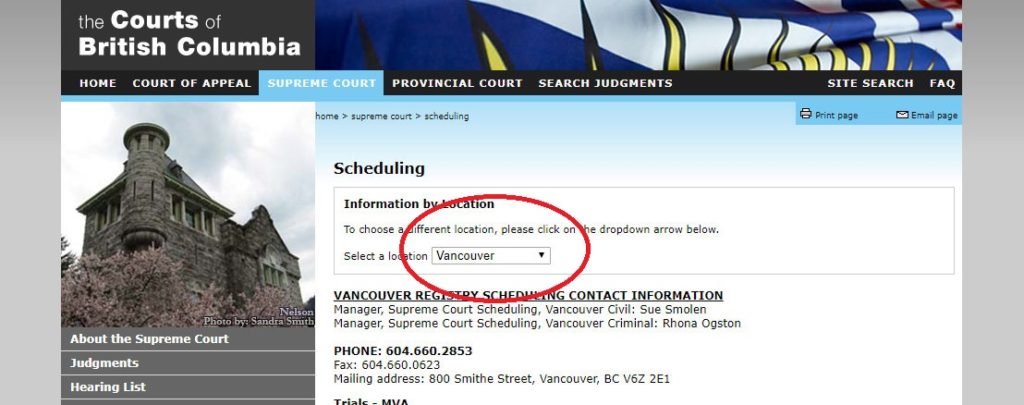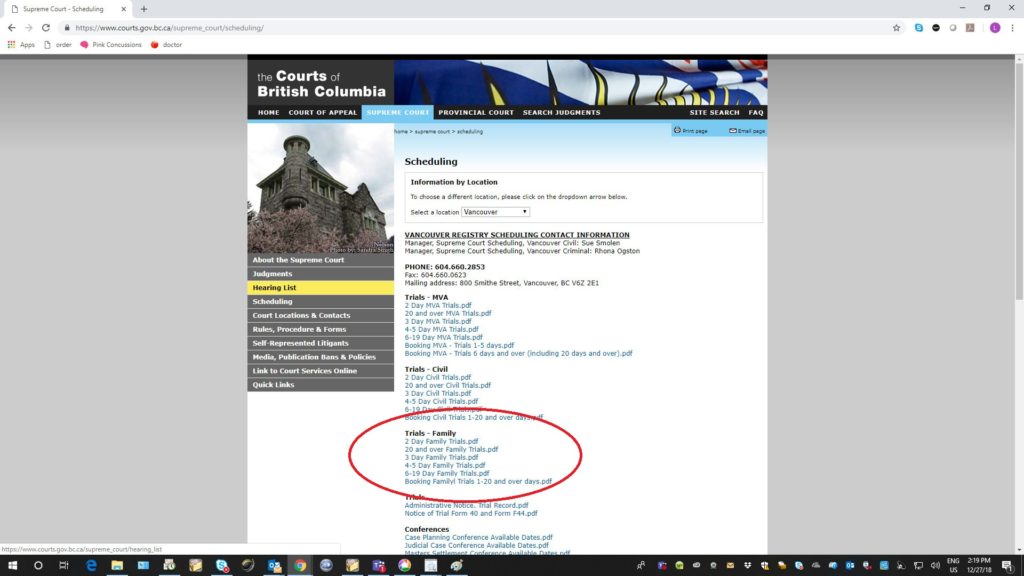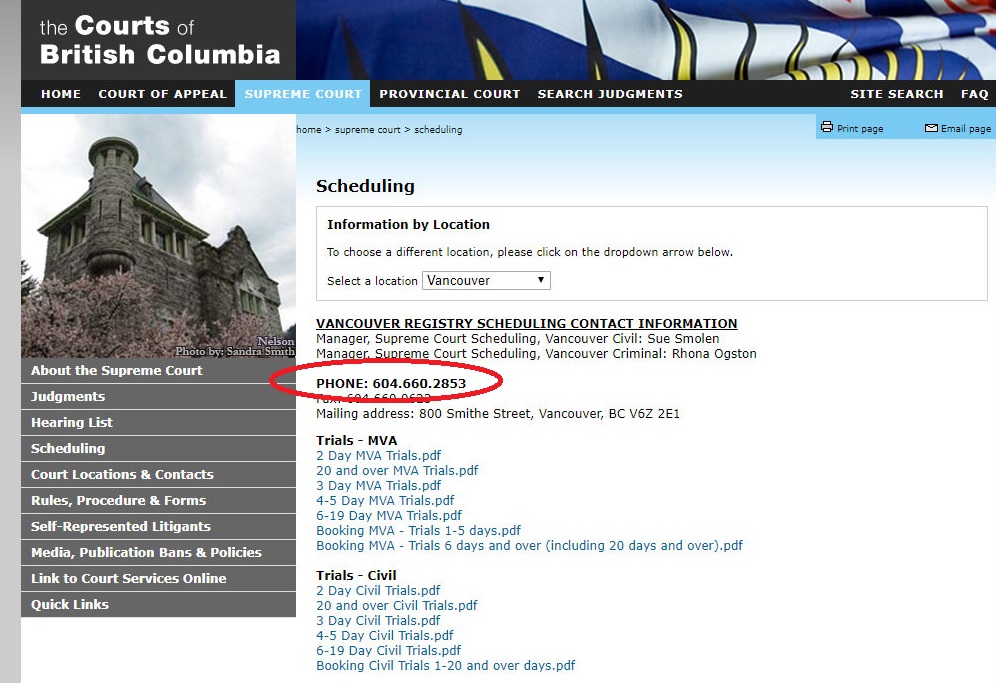How to Prepare for Family Law Trial at BC Supreme Court
If you fail to follow one of the many procedural steps or rules before your trial (as explained below), the Court Registry will be more than happy to cancel or strike your trial and give the time to someone else. This is because Courts are extremely busy, and everyone is waiting to get heard by a judge. If you forget or ignore to follow strict procedural or time rules, you will have a very high chance of having your trial cancelled. You will then have to re-book your trial, which means you may have to wait months, if not years, to be heard. No one wants that, including my ex-client, who inspired me to write this blog post on how to prepare for a family law trial at the BC Supreme Court.
Table of Contents
- 1 Thank My Ex-Client
- 2 Is Your Trial at the Provincial Court or the Supreme Court of BC?
- 3 How to Prepare for your Family Law Trial at the BC Supreme Court
- 3.1 Step 1: Book Your Family Law Trial at BC Supreme Court
- 3.2 Step 2: Complete Examination for Discoveries (3-6 months before trial)
- 3.3 Step 3: File and Serve Your Trial Brief (35 to 45 days before trial)
- 3.4 Step 4: Attend Your Trial Management Conference (28 days or more before trial)
- 3.5 Step 5: File Your Updated Financial Statement (28 days before trial)
- 3.6 Step 6: Serve Your Updated List of Documents (a month before trial)
- 3.7 Step 7: File and Serve a Trial Record (14 to 28 days before trial)
- 3.8 Step 8: File and Serve Trial Certificate (14 to 28 days before trial)
- 3.9 Step 9: Prepare Your Book of Documents (days before trial)
- 3.10 Step 10: Prepare Your Book of Authorities (to use at trial)
- 3.11 Step 11: Prepare your Opening Statement (first day of trial)
- 3.12 Step 12: Prepare your Closing Argument (last day of trial)
Thank My Ex-Client
So I got my first ever negative review online from an ex-client who expected me to advise her of all the procedural steps she needed to follow for her trial after she decided to represent herself due to financial difficulties.
Everything was great until the court cancelled her trial because she didn’t know she had to file one of the many forms at the Supreme Court of BC. And she blamed me for it even though I hadn’t heard from her for months and was not representing her in any shape or form. It hurt.
Anyway, any good lawyer will take criticism and turns it into something constructive. So I got inspired to write this blog. Thank my ex-client for it at my cost.
Is Your Trial at the Provincial Court or the Supreme Court of BC?
Family law trials occur either at the BC Provincial Court or the BC Supreme Court. This article discusses preparing for your family law trial at the Supreme Court. I will also be writing a blog post regarding procedures to follow at the Provincial Court shortly.
Remember, no matter how detailed this blog is, it still wouldn’t have all the information on exactly what you need to do to prepare for your family law trial in BC.
It is always best to at least have a consult with a Family Law Trial Lawyer to learn about your rights and obligations. Contact our award-winning law firm to set up a consult if you are facing a family law trial. Call 604-974-9529 or get in touch.
How to Prepare for your Family Law Trial at the BC Supreme Court
I assume you have finished your Judicial Case Conference at the Supreme Court. This means I will not talk about filing your BC Notice of Family Claim or providing a response to it, filing your counterclaim, filing your Financial Statement, or attending the Judicial Case Conference.
Let’s look at the steps to follow:
Step 1: Book Your Family Law Trial at BC Supreme Court
In the first step to prepare your family law trial, you need to book it and follow these steps:
- Agree on how long your trial will last. Most family law trials last a minimum of 5 days, and some run for about 50 or more days. I know, I know, most people think they can finish a trial in 2 hours. I wish. Five days will seem like lightning speed when you must follow thousands of family law rules and procedures to conduct a trial properly. Read on, and you will see what I mean.
- Look at available court dates online. Be careful to look for the available court dates where your trial will happen. The court’s website usually defaults to the Vancouver Supreme Court. You will need to change the court location from the top-down menu:

Choose the correct court from the drop-down menu.
3. Pick the length of the trial and click on the appropriate link to see the available dates:

Make sure you look for the family law trials section.
4. Call the Registry to book the trial. After you select the appropriate court location, the phone number of the Registry will show up:

Call the Registry to book the trial.
5. After booking the trial, you will have 30 days to pay the trial booking fee (around $200) to secure your trial.
6. You will need to complete, file and serve a Notice of Trial on all parties to inform them of the official trial date.
OK, now that you have booked your trial, here are some of the other stuff you need to do:
Step 2: Complete Examination for Discoveries (3-6 months before trial)
Examinations of Discovery in BC or depositions are not mandatory but are highly recommended for almost every Supreme Court family law trial in BC. It is rare for family law trial litigants not to have done Discoveries.
The judge at your Trial Management Conference (explained below) will ask whether you have completed them. If the answer is a ‘no,’ the judge may ask you why or may be dismayed. They might even adjourn your trial in extreme circumstances so that you can complete your discoveries.
It is best to attend and conduct an Examination for Discoveries at least six months before trial. Still, if you haven’t already done so, you will need to attend examinations for discovery as follows:
- If you or your lawyer need to examine the other party, you or him/her will need to complete an Appointment to Examine for Discovery and serve it on the opposing party at least seven days before the Discoveries. However, almost everyone in a family law case will try to arrange the date based on the availability of all involved weeks or months ahead.
- If you are going to be examined, the other party or his/her lawyer will have to serve you with the Appointment to Examine for Discovery.
- The Appointment will state the time and location of the Discoveries.
- Some of the agencies that offer space and services to conduct depositions in Vancouver and New Westminster are as follows:
- Charest Reporting in downtown Vancouver – You get delicious snacks here. The offices are nice and bright, and the reporters are professional. It is more expensive than the other reporting companies, but hey, depositions are not fun, and the whole day is exhausting, so it would be nice to have snacks and drinks and have some light in the offices to realize this is not the end of the world and it shall pass.
- Coast Reporting in downtown Vancouver – fewer snacks and drinks, office is a bit darker and smaller, but cheaper than Charest. So if money is tight, you may get a good bang for your buck here.
- Reportex in New Westminster right by the courthouse – fewer snacks and drinks but friendly staff.
Step 3: File and Serve Your Trial Brief (35 to 45 days before trial)
If you are the Claimant or the Respondent, you must file and serve your Trial Brief at least seven days before the Trial Management Conference (explained below). Again, if you fail to file and serve your trial brief, the Registry may strike your TMC and Trial. You will have to follow the steps below, show up in court, and explain why you failed to file and serve your Trial Brief.
Step 4: Attend Your Trial Management Conference (28 days or more before trial)
A trial management conference in BC is a meeting between a judge and the litigants or their lawyer at least 28 days before trial. The judge will see whether the trial is ready to proceed and whether he/she needs to make procedural orders to ensure the trial happens in an organized manner.
Your trial management conference must occur at least 28 days before your trial. If you do not book your TMC and it is not heard in time, the Registry may automatically strike your trial from its list, and you may lose your booking.
If you catch the strike in time, you can immediately apply to the Court on Short Leave and explain why you failed to book the TMC 28 days before trial. You can ask the judge to order a TMC date so you can reset your trial on its initially booked date.
This experience is often very embarrassing and stressful because no judge likes to waste his/her time because a litigant forgot to follow court steps. If you are lucky, you will walk away with your trial reset, a TMC ordered, and some heated comments. If you are unlucky, you will have to re-book your trial at a future date which can be in months or years ahead.
Step 5: File Your Updated Financial Statement (28 days before trial)
You must file and serve an updated Financial Statement at least 28 days before your trial. This is a Rule, and you must follow it to save any embarrassment at trial.
If you fail to file and serve an updated Financial Statement, you might be fined or sanctioned by the court at your trial. Sorry for all the threats, but it’s true. A trial is not for the faint of heart.
Step 6: Serve Your Updated List of Documents (a month before trial)
If you have any documents or documentary evidence you want to admit or rely on at your trial, you will have to complete or update your List of Documents and serve them on the other side at least a month before trial.
You will likely have to update and serve more documents even in the days or hours before the trial as they become available.
If you do not include a document in your List of Documents, the judge may not allow you to rely on the document at trial.
Step 7: File and Serve a Trial Record (14 to 28 days before trial)
If you are the party who filed and served a Notice of Trial, 14 to 28 days before trial, you must file and serve a trial record. A Trial Record contains:
- the notice of family claim and response to the family claim, counterclaim and response to counterclaim,
- particulars served under a demand, together with the demand made,
- the most current Form F8 financial statement filed by each party,
- any order relating to the conduct of the trial, and
- anything else the court may order (usually at the TMC).
A trial record is often bound and has an index.
Step 8: File and Serve Trial Certificate (14 to 28 days before trial)
Within 14 to 28 days before trial, all parties must file and serve their Trial Certificates. Trial Certificates include:
- a statement that the party filing the trial certificate will be ready to proceed on the scheduled trial date;
- a statement certifying that the party filing the trial certificate has completed all examinations for discovery that the party intends to conduct;
- the party’s current estimate of the length of the trial;
- a statement that a trial management conference has been conducted in the family law case.
If no party files a trial certificate at least 14 days before trial, the trial MUST be cancelled and removed from the trial list.
Step 9: Prepare Your Book of Documents (days before trial)
A book of documents is usually in the form of a binder and contains essential documents that each party intends to rely on at trial. Only documents already listed in the List of Documents can be included in the Book of Documents.
Usually, at the TMC, the judge orders the parties to exchange Books of Documents or to have one joint book of documents for the trial judge. The reason why most judges order a joint book of documents is so that the trial judge does not have to swift through multiple binders to find a document.
These procedures are highly complicated and need expertise and attention to detail. It is always best to at least have a consult with a Family Law Trial Lawyer to learn about the procedure you need to follow in advance of your BC Supreme Court family law trial. Contact our award-winning trial lawyers to set up a consultation if you face a family law trial. Call 604-974-9529 or get in touch.
Step 10: Prepare Your Book of Authorities (to use at trial)
A book of authorities is usually a binder or a bound document that includes all the court case precedents a party intends to rely on at the time of trial. It usually consists of an index.
Case precedents are used to prove the applicable law that relates to your case to a judge. Sometimes if the factual background of another case is similar to yours, you can use the case in your favour if you like the case results.
Step 11: Prepare your Opening Statement (first day of trial)
The opening argument of a party at the BC Supreme Court is often in written form and provides a brief overview of the fact and issues of the case at hand. It is usually divided into the following sections:
- Issues;
- Background Facts;
- Brief introduction of witnesses to be called;
- A time estimate for each witness;
- Identification of assets/children/incomes of the parties.
- Explanation of issues at dispute.
An opening statement should not be argumentative or try to prove a point. It is merely to tell the judge what the case is about. Usually, the Claimant opens the trial through the opening statement.
The respondent should also have an opening statement prepared in case the judge wants to hear the respondent as well.
Step 12: Prepare your Closing Argument (last day of trial)
Closing arguments at the BC Supreme Court are usually written, prepared by all parties and represented at the end of the trial. They include the facts, arguments and orders sought by each party. They are meant to convince the judge to rule in a litigant’s favour. They are often divided into the following sections:
- Issues;
- Background facts;
- The parties’ version of facts in dispute;
- Overview of witness’ testimonies;
- The applicable legislative law to each issue;
- The applicable case law to each issue;
- Application of the law to the case at hand;
- Orders sought.
It requires multiple other substantive steps to prepare for your family law trial at the BC Supreme Court, including how to direct and cross-examine witnesses, strategy, knowledge of the law and facts, etc.
It is always best to at least have a consult with a Family Law Trial Lawyer to learn about your rights and obligations. Contact our award-winning law firm to set up a consult if you are facing a family law trial. Call 604-974-9529 or get in touch.

